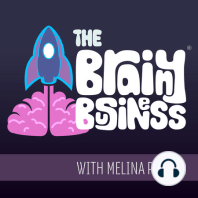53 min listen

87. Social Proof: How to Use Herding to Boost Engagement and Sales
FromThe Brainy Business | Understanding the Psychology of Why People Buy | Behavioral Economics
87. Social Proof: How to Use Herding to Boost Engagement and Sales
FromThe Brainy Business | Understanding the Psychology of Why People Buy | Behavioral Economics
ratings:
Length:
39 minutes
Released:
Feb 14, 2020
Format:
Podcast episode
Description
Social proof was introduced by Robert Cialdini in his book Influence. It’s one of the six principles of persuasion (accompanied by reciprocity, scarcity, authority, consistency, and liking). I talked about social proof in last week's episode on Peloton. I talked about the infamous ad that made Peloton have a dramatic drop in market value, but I also talked about all of the things they were doing right and how they were using availability, priming, stacking and bundling offers, money back guarantees, reciprocity, choice architecture, herding and…of course…social proof. I’ve heard from many of you who are actually considering getting a Peloton after that episode. That wasn’t my intention, but something I love to hear because we have been so happy with ours (and it is an example of the third type of social proof - users). Herding and social proof are closely related. When social proof is present, we are more likely to herd. We also look for social proof because it helps us validate our decisions. I’ll talk about the six types of social proof which are expert, celebrity, user, wisdom of the crowd, wisdom of friends, and certification. I’ll show how our biased brains are susceptible to social proof, ways it shows up, and how easily it can be implemented in any business – and why it is important to incorporate it. Show Notes: [02:28] Social proof is closely related to herding. [02:39] The concept of social proof was first introduced by Robert Cialdini. Cialdini’s 1984 book Influence: The Psychology of Persuasion introduced the concept of social proof as one of the six principles of persuasion (the others are reciprocity, scarcity, authority, consistency and liking). [03:34] Social proof and herding feels a bit like a chicken and the egg situation. We are a herding species, we look for social proof to validate our decisions and be accepted by the group, but when social proof is present…we are more likely to herd. Which came first? [04:31] Having a lot of other people (or the right people) who have made the same choice in the past (regardless of whether or not it is a good one) is the social proof we need to nudge us into making the same choice. [05:01] You may be using social proof in your business or have seen it used in other businesses. Now you have scientific proof that these methods work. [05:19] The six types of social proof are: expert, celebrity, user, wisdom of the crowd, wisdom of friends, and certification. [05:52] Expert social proof would be when someone who is an expert in the industry recommends or speaks on behalf of a product or service. An expert extends a halo effect to the organization who brought them there. [06:37] Be aware of authority bias. People are conditioned to believe those who are in authority. [07:55] In your business, consider who an expert is on a topic, and how you might be able to bring them in to interact with your audience. [08:35] Experts lend credibility and the value of social proof to a brand – they make people feel comfortable about working with you. [08:59] Celebrity: There is a clear value in having a celebrity talk about your product. [10:01] You need to reach the right people in a way that will encourage them to take action. [11:12] Microinfluencers can impact your business by reaching the people who are likely to buy. [11:50] Just because a celebrity is easy to get, doesn’t’ mean they are a good fit for you or your brand. It is important to be discerning and make sure there is alignment. [12:08] The perceived personality of the celebrity carries over onto the perceived personality of the brand. [12:45] Have a user talk about your product. You could also stack this with a celebrity who used your product. [13:16] Incorporating users includes reviews and testimonials. [13:30] People are more likely to be influenced by those who they consider to be like themselves. This is the herding piece in action, along with our personal biases toward our own in-group. [15:25] Cialdini's towel example
Released:
Feb 14, 2020
Format:
Podcast episode
Titles in the series (100)
11. Anchoring & Adjustment: The 1 Word That Increased Sales 38%: Today’s behavioral economics podcast is another foundational episode focusing on anchoring and adjustment. My last foundational episode was and even though it has only been out about a week, it has been one of my most popular episodes to date. You... by The Brainy Business | Understanding the Psychology of Why People Buy | Behavioral Economics